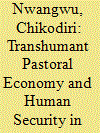| Srl | Item |
| 1 |
ID:
193199


|
|
|
|
|
| Summary/Abstract |
This paper examines the phenomenon of crime–terror nexus from the standpoint of the linkage between banditry and Boko Haram insurgency in Northern Nigeria. Using a descriptive analysis predicated on a combination of primary and secondary studies, the paper reveals that both groups have functionally adapted each other’s structures and strategies. While Boko Haram and its splinter groups have occasionally engaged in acts of banditry, there has been mutual co-option by both groups as the exigencies of their operations demand. Nigeria’s drive at mitigating the banditry-terrorism conundrum must proceed with a pragmatic understanding of the gamut and dynamics of their situational nexuses.
|
|
|
|
|
|
|
|
|
|
|
|
|
|
|
|
| 2 |
ID:
176087


|
|
|
|
|
| Summary/Abstract |
The past two decades that coincide with the return of civil rule in most African countries have witnessed the reinforcement of ethnic nationalism and separatist agitations. While scholarly attention has focused on ethnicity to explain the revival of ethnic nationalism, how ethnic and class discourses conflate in the pursuit of ethnic nationalism remains understudied. Using a qualitative-dominant approach, this article interrogates how the Igbo petty bourgeoisie use ethnicity to mask the underlying differences in their material conditions in relation to the alienated masses. It also examines how these differences shape post-war Igbo nationalism. In the main, this article argues that the intersection of ethnic and class discourses is underpinned by unequal distribution of rights and powers accruing from productive resources. This unequal distribution of rights and powers results in differential material well-being and gives rise to conflicts between the dominant and subordinate classes. This explains the divergent approaches of the different factions of Igbo petty bourgeoisie to Igbo nationalism in Nigeria. The article concludes that understanding the political economy of the intersection of ethnic and class discourses is relevant for resolving the nationality question and the Biafra secessionist agitations in Nigeria and others across Africa.
|
|
|
|
|
|
|
|
|
|
|
|
|
|
|
|
| 3 |
ID:
175107


|
|
|
|
|
| Summary/Abstract |
The limited access to land in most African states has engendered a fierce competition, especially among various agricultural user groups. The two major groups of agricultural land users are transhumant pastoralists and sedentary peasant farmers. The internecine conflict between these agro-user groups has grave implications for human security in Nigeria and beyond. Explanation of the conflict has centred on climate change and environmental security, population growth and urbanisation, and insecurity. However, the transnational character of this conflict, often made possible by relevant regional protocols, has not received adequate scholarly attention. This paper argues that networking of regional bodies and other stakeholders is the panacea for tackling the tension-soaked relationship between these land users.
|
|
|
|
|
|
|
|
|
|
|
|
|
|
|
|